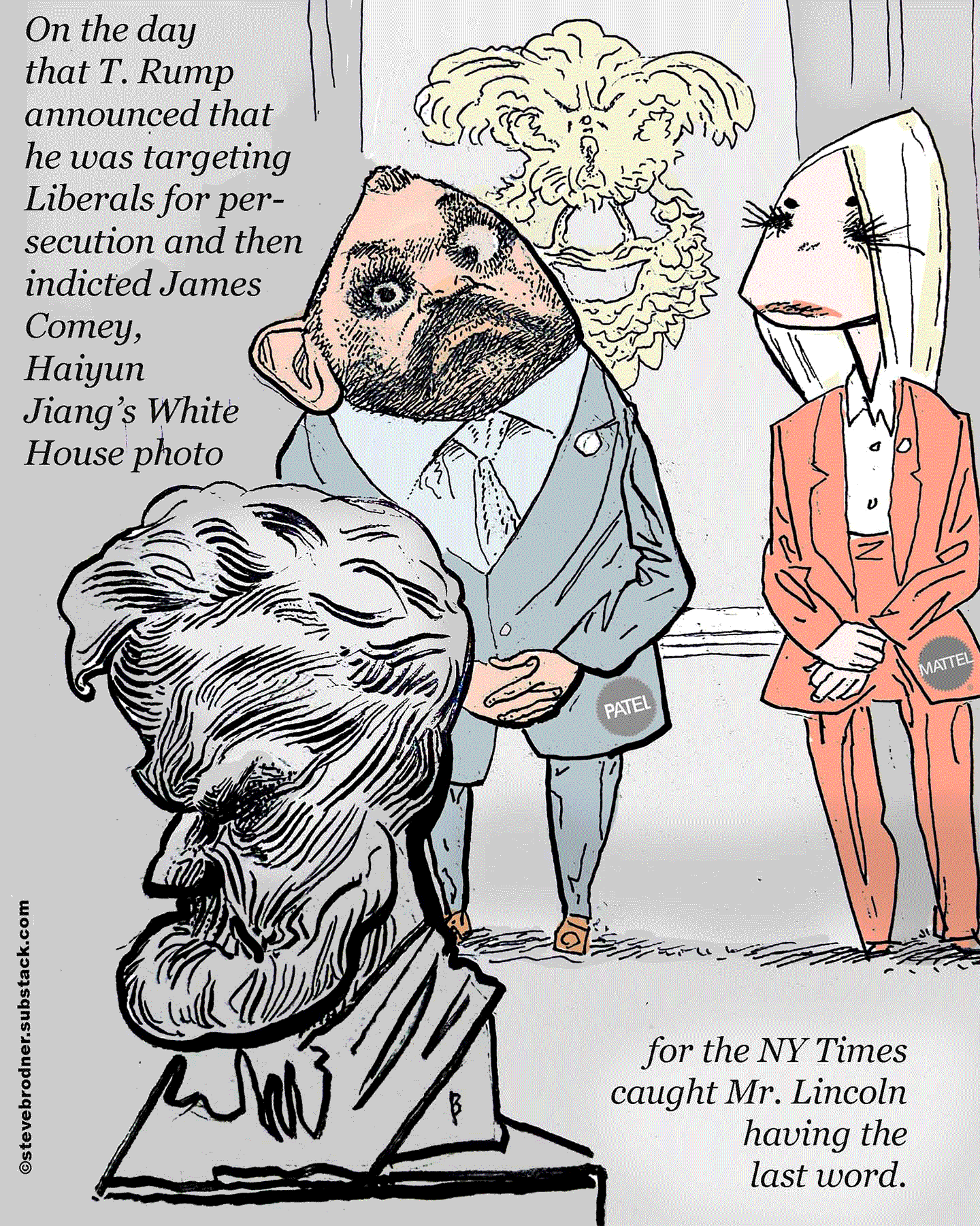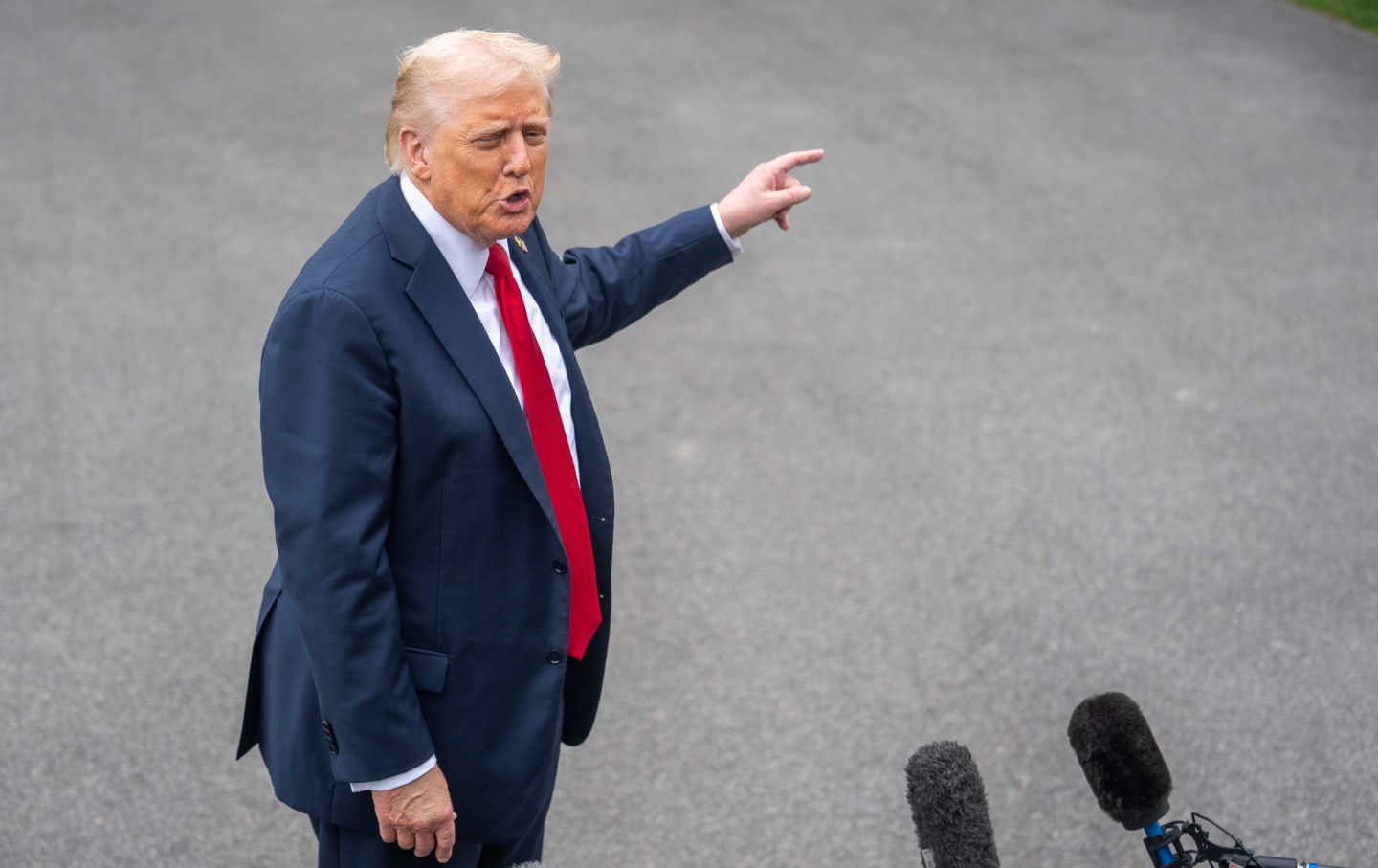Trump and Hegseth’s Plan for the “War Within”

The generals and admirals who traveled from their posts around the world to Quantico, Virginia, last month to hear from President Trump and Secretary of War (as he now fashions himself) Pete Hegseth have been training for over a dozen years to fight and overcome China and or Russia in an all-out, high-end conflict. They have also, most of them, worked hard to make room for women and people of color in the higher echelons of leadership. But on September 30, they were told to put all that aside, and to dismantle the diversity measures they had long embraced, while also mobilizing for the “war within.”
Without actually coming out and saying it, Trump indicated that the primary focus of US strategy would now shift from a focus on war with other great powers to combatting narco-cartels in Latin America and leftist “insurrectionists” in US cities. Hegseth, for his part, hinted that women will henceforth be discouraged from joining the military and that Black officers and personnel will find it difficult to get promoted.
These objectives are not expressed overtly or in ways that people outside the US military might grasp. But they run like a dark current through everything Trump and Hegseth said. And they share a common theme: Democratic rules and values, whether expressed in the public sphere or the ranks of the Armed Forces, will no longer be tolerated in this country.
The War Within
Trump never said to the assembled officers, “You must adapt to a new defense policy, consisting of the following elements…” Rather, his new, US-focused strategic outlook was spelled out in drips and drabs, often attached to other pet Trumpian concerns, such as tariffs, Biden’s incompetence, and his own alleged success in ending wars. But the underlying theme was unmistakable.
Many US cities are safe, he claimed, “but it seems that the ones that are run by the radical-left Democrats—[look] what they’ve done to San Francisco, Chicago, New York, Los Angeles—they’re very unsafe places, and we’re going to straighten them out one by one.” Then, facing the assembled officers, he added, “This is going to be a major part for some of the people in this room. That’s a war, too. It’s a war from within.”
Current Issue

A war from within? Trump then went on to describe major Democratic-governed US cities like those four and Portland, Oregon, as “war zones,” requiring military intervention. The governor of Illinois (J.B. Pritzker, whom he slandered but did not name) says he doesn’t need the military, but “no,” he stated, “they need the military desperately.” And that, he said, will happen “very soon.”
Focusing on the “war within,” Trump acknowledged, will constitute a fundamental change in US military policy, comparable in scale to the shift from Cold War paradigms to the Global War on Terror. “Only in recent decades did politicians somehow come to believe that our job is to police the far reaches of Kenya and Somalia,” he averred. But now: “We’re under invasion from within. No different than a foreign enemy, but more difficult in many ways because they don’t wear uniforms.”
Who are these domestic enemies who don’t wear uniforms? Trump did not make this very explicit but periodically let slip his understanding of who fits in that category: anyone who chooses to “go after our ICE people”; paid “insurrectionists” funded by George Soros and others among “the radical left”; and urban protesters of all sorts. Mostly, though, it’s just “them”—presumably, anyone who has actively resisted Trump’s policies (including, of course, many readers of The Nation).
And how will these protesters be treated? About that, Trump is clear: The military forces being sent into American cities to restore order will be authorized to use force against any militant expression of public opposition, lawful or not. To make this point, he described some Biden-era confrontation between protesters and National Guard personnel in which, he claimed, a woman spat at a Guardsman, who supposedly was under orders to remain passive. Then, implicitly characterizing all protesters as likely spitters, Trump avowed that such behavior will no longer be tolerated. “If it’s OK with you, generals and admirals, I’ve taken that off. I say, ‘They spit, we hit.’”
Trump did not go on to specify what he meant by “we hit,” but he was not discussing police officers equipped with billy clubs but rather active-duty military personnel armed with rifles and grenades. These are war zones, after all, and US forces will be deployed to “straighten them out.”
For the generals and admirals in the room, the message could not be more explicit: Be prepared for orders to leave your command posts abroad and return home to deploy your forces in American cities, and to use them in suppressing peaceful protests by American citizens.
The New Southern Strategy
As part of this reversal of roles, the officer corps was also told to prepare for a bigger role in fighting drug cartels and other hostile forces in South and Central America. “We’re also restoring a needed focus on defeating threats in the Western Hemisphere,” Trump told the officers. “Throughout this region, cartel terrorists have been allowed to wage a relentless campaign of death and destruction on our country, all because we had weak leadership on top” (i.e., President Biden).
Waging war against the cartels is a legitimate use of military power, Trump avowed, given all the harm they are inflicting on the American population—notably through the supply of fentanyl. “We have to put the traffickers and cartels on notice…. If you try to poison our people, we will blow you out of existence, because that’s the only language they really understand.”
Trump did not go on to identify the cartels responsible for “poison[ing] our people,” but made it clear that he was largely focused on Venezuela—a relatively minor player in the illicit drug trade to the United States. (According to the US Drug Enforcement Administration, virtually all of the fentanyl smuggled into the United States is supplied by the Sinaloa and Jalisco cartels in Mexico.) Nevertheless, Trump claimed that the three boats recently sunk by US forces in the Caribbean were carrying fentanyl from Venezuela, painting that country as the principal target of future US military action in the region.
As the number of US strikes against supposed Venezuelan drug vessels has increased—Trump ordered another such attack on October 3, killing the four people aboard—both Democrats and Republicans in Congress are insisting that such attacks violate domestic and international law, sparking a debate on the legality of the actions. This debate is important, given that key pillars of international law are at stake; for the officers assembled at Quantico, however, the key message here is the elevation of Latin America and the Caribbean as a key theater of conflict, with the potential for extensive US combat activities in the region. Such a move, they are sure to know, could result in diminished US preparedness for a war with China or Russia, and an increased risk of protracted intervention—accompanied by all the woes experienced in Iraq and Afghanistan.
Ridding the Military of Women and Other Unwanted Personnel
While Trump spoke of the new tasks now being assigned to US military forces, Secretary of War Hegseth focused on the future composition of those forces. In contrast to the inclusive personnel policies of the past—policies aimed at increasing the number of women, Blacks, and other people of color in senior leadership positions—the military would now eschew inclusivity in favor of forging a male-dominated, predominantly white-led force. Hegseth never explicitly stated that this was his goal but rather devoted the majority of his comments to attacks on equity-and-diversity policies and loose fitness standards.
“We have a sacred duty to ensure that our warriors are led by the most capable and qualified combat leaders,” he told the assembled officers. “For too long, we have simply not done that…. For too long, we’ve promoted too many uniformed leaders for the wrong reasons, based on their race, based on gender quotas, based on historic so-called firsts.”
All this, he said, has become a “distraction” to the military, and so must be obliterated. “As I’ve said before and will say again, we are done with that shit. I’ve made it my mission to uproot the obvious distractions that made us less capable and less lethal.” This means, he explained, “no more ‘identity months,’ DEI offices, dudes in dresses. No more climate change worship. No more division, distraction or gender delusions.”
Popular
“swipe left below to view more authors”Swipe →
For the Black and female officers attending the Quantico event, this could only mean one thing: More of them are likely to be fired in the days ahead, adding to a list of senior officers already removed by Hegseth, including Gen. C.Q. Brown, chairman of the Joint Chiefs of Staff (the second Black man, after Colin Powell, to occupy this high-level position); Adm. Lisa Franchetti, chief of naval operations (the first woman to hold this post, the top Navy leadership position); and Adm. Linda Fagan, commandant of the Coast Guard (the first woman to hold this post).
Black officers, Hegseth suggested, should not expect promotion to higher rank, claiming that their presence in the officer corps was due not to merit but rather to political interference, in the form of diversity and equal opportunity endeavors. “Standards have been manipulated to hit racial quotas,” he asserted, without providing any evidence for this. But such interference, Hegseth stated, will no longer be tolerated. “No more distractions, no more political ideologies, no more debris,” he said.
The message to the female officers present was even more stark. You got here, he indicated, only because physical standards had been lowered to enable women to serve in frontline combat units—a policy he said would be revoked. “Any place where tried and true physical standards were altered, especially since 2015 when combat arms standards were changed to ensure females could qualify, must be returned to their original standard.” (In 2015, then–Secretary of Defense Ash Carter directed that all frontline combat positions be opened to female soldiers.)
From now on, Hegseth indicated, all combat personnel must satisfy “the male-level physical standards for combat positions,” or leave the military. He also indicated that those “male-level physical standards” will be raised, making it difficult for even healthy males to attain. While some extremely fit and dedicated women may prove capable of meeting these standards, it is obvious that Hegseth seeks to drive most women out of the military, or at least out of frontline forces.
The ultimate objective of all this is clear: to reverse the diversification and democratization of the US military—a process that had been under way since 1948, when President Harry S. Truman signed Executive Order 9981, ordering the desegregation of the Armed Forces. Such efforts, US leaders have often stated, are intended to ensure that the US military is representative of the population as a whole, thereby fulfilling its democratic ethos. Without criticizing this objective directly, Hegseth made clear his determination to eradicate all such initiatives. With this speech, he declared, “[we’re] fixing decades of decay…clearing out the debris, removing the distractions.”
The Assault on Democracy
Although addressing somewhat different matters, the comments by Trump and Hegseth at the Quantico assembly should be interpreted as two sides of the same, antidemocratic coin. Trump signaled the forthcoming military assault on the dissenters “within,” while Hegseth spoke of purging the military of any potentially democratizing influences. The latter is essential for success in the former, of course, as a more diverse, representative military might balk at firing on unarmed Americans, whereas an overwhelmingly white male force might be less inhibited in doing so (or this, at least, is Trump’s suspicion, given his backing for Hegseth’s firings of senior Black and female officers).
Much attention has been paid by Trump’s opponents to the battles being fought in US courts over the president’s unending array of attacks on legislative prerogatives and constitutional rights. Far less attention, however, has been paid to developments in the military sphere and within the newly renamed Department of War. But as a careful reading of Trump’s and Hegseth’s speeches demonstrates, these developments could prove every bit as momentous as those occurring in the nation’s courtrooms.
More from The Nation

Lobbyists for foreign countries have long helped other governments influence US policy, but nothing compares to the brazen corruption of the second administration of Trump.
Casey Michel

Facing rebukes from the courts, Stephen Miller and Elon Musk are threatening the independence of the judiciary.
Jeet Heer


Trump’s attacks on alleged drug boats are illegal acts of murder. But too many Democrats are shying away from calling the president out.
Jeet Heer




